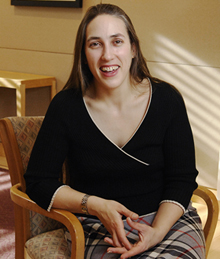For the Love of Shakespeare
BU People: Jennifer Formichelli brings the Bard to spoken life

The best way to appreciate Shakespeare’s plays, says Jennifer Formichelli, isn’t what you’d think: it’s to read them aloud for yourself. So in December the College of Arts and Sciences Core Curriculum lecturer invited students from her seminar lecture courses to take part in an optional weekend reading of Hamlet, a play she taught her first semester as a teacher at BU this fall.
“While I think you can certainly gain something by reading Shakespeare’s plays silently or even seeing them performed on stage, you don’t get nearly as much out of it unless you utter the words yourself,” Formichelli (UNI’96) says. “Only then do you begin to understand Shakespeare’s syntax and diction.”
A complete reading of Hamlet — with its three acts and traditional Renaissance dialogue — typically takes between three and a half and four hours. That’s a huge commitment for students to make outside of the classroom, particularly during the weekend before final exams, and Formichelli was pleased that 15 students came to the reading. “They really began to attend to the language,” she says.
Many high schools include Hamlet in their English curriculum, but Formichelli believes that students don’t truly begin to appreciate the play’s genius until they are older. “I love reacquainting people with the familiar,” she says. “Hamlet is a wonderful play to teach because it really shows you why Shakespeare is deserving of one’s love.”
Although she studied American literature in graduate school — she earned master’s and doctoral degrees from Newnham College at the University of Cambridge — Formichelli’s devotion to the Bard led her to form a Shakespeare reading group at Cambridge. Each Friday evening, she and 15 others — ranging in age from 19 to 55 — would gather for as long as four hours to read Shakespeare’s tragedies and comedies. “Each of us would choose a role from a hat,” she recalls. “We read about 20 plays the first year, and then we finished them the second. With each reading, people got better and better.”
Eventually she hopes to form a similar group at BU. “I think there’s definitely a niche for something like that here,” she says, “and I want my students to have the opportunity to fully experience Shakespeare.”
Although the courses she currently teaches cover a wide range of writers — her freshmen and sophomore classes read authors from Machiavelli to Milton — Formichelli says she enjoys teaching the lecture series because she meets so many students. “It’s interesting to observe the different age groups,” she says. “The freshmen tend to be very serious, whereas the sophomores are a little more laid back. It’s a privilege to help them develop their interests.”
When Formichelli arrived as a freshman at BU, she intended to study history and economics and eventually become a lawyer. After two years, she says, she realized that “my math skills weren’t strong enough,” and under the guidance of Christopher Ricks, BU’s William M. and Sara B. Warren Professor of the Humanities, she completed a degree in literary history.
“I’d always enjoyed poetry, but I never believed it was something I could make a living doing,” she says. “But after that first class with Professor Ricks, I remembered that when I was younger, I’d dreamed of being a teacher.”
Formichelli compares learning to falling in love. “You fall in love with the knowledge long before you’ve attained it,” she says. “And you attain the knowledge because you’ve fallen in love.”
Vicky Waltz can be reached at vwaltz@bu.edu.